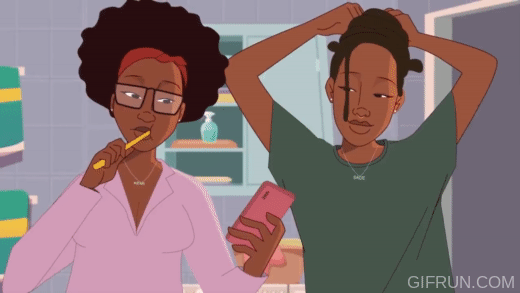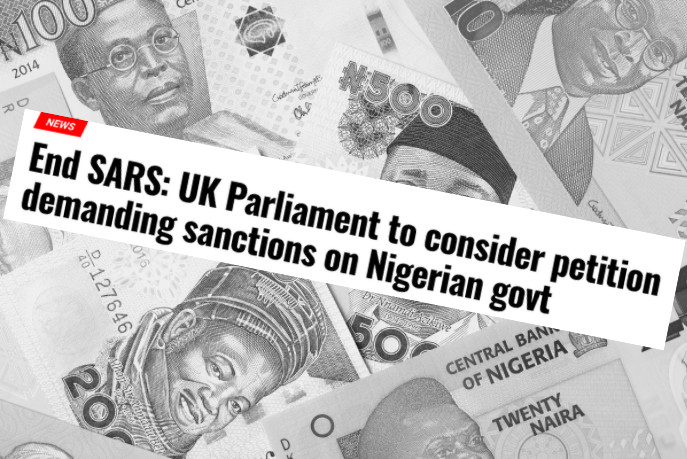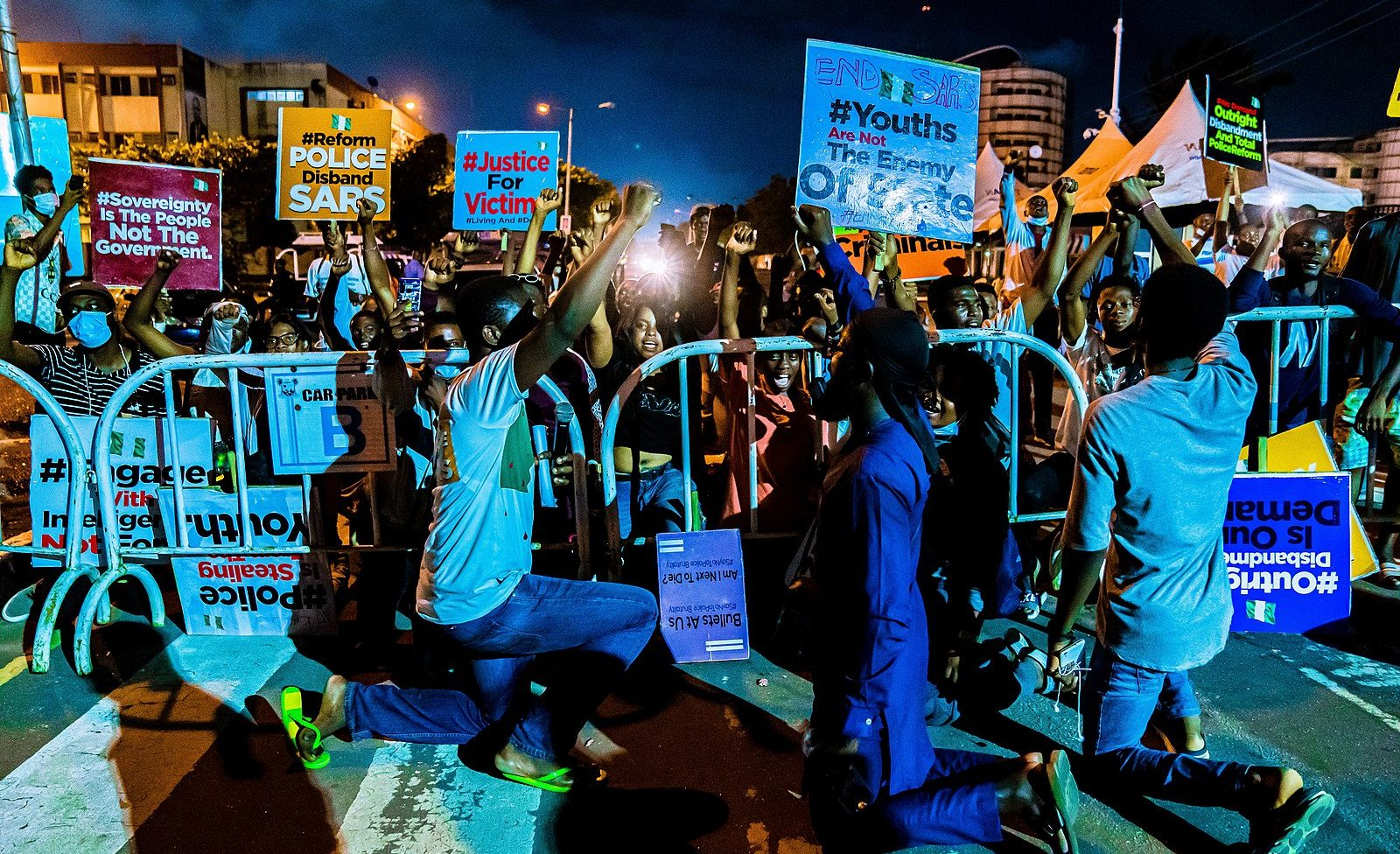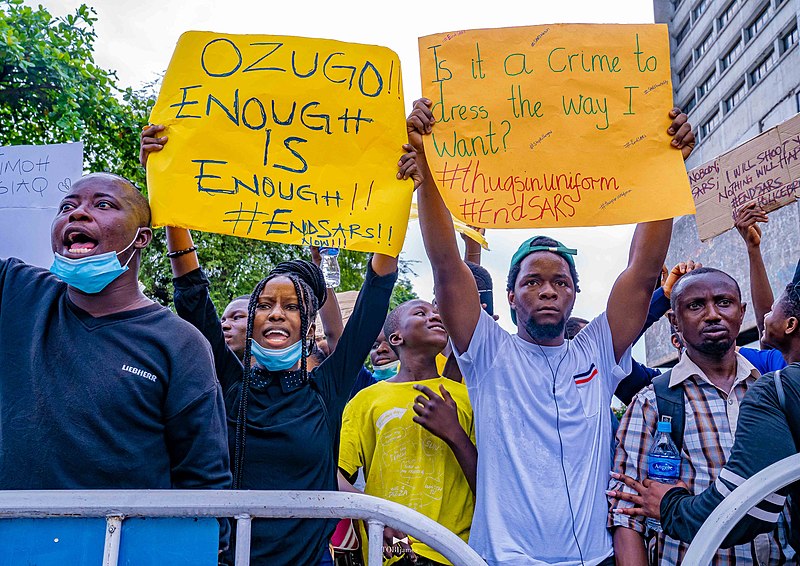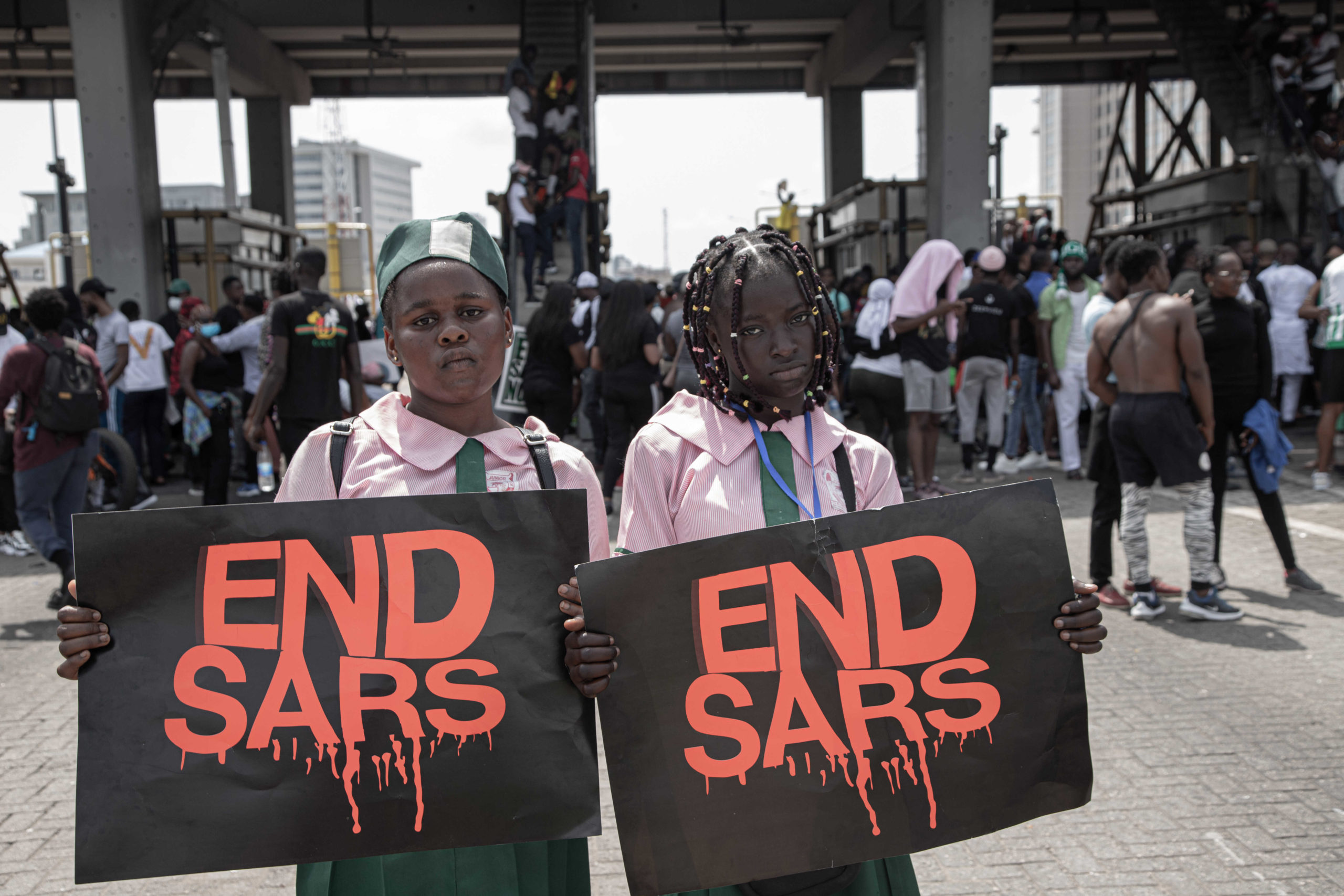
Photography courtesy of Feminist Coalition: Ire Aderinokun, Odunayo Eweniyi, Karo Omu, Damilola Odufuwa, Layo Ogunbanwo
Feminist Coalition: ‘We joke we have sanitised the word feminism for Nigerians’
Three months after the Lekki Massacre, we speak to the activist group about equality, police brutality, the outcome of the #EndSARs protests and their future endeavours.
Oluwatobi Omotoso
20 Feb 2021
The Feminist Coalition is a name we heard many times during the #EndSARs protests in 2020. They surfaced on the internet as a mysterious group that helped create a safe space for Nigerians to carry out their constitutional rights to protest, by providing protesters with food, shelter and security against police brutality. They also offered medical and legal aid to those injured and detained during the protests, while consoling the loved ones of those lost with bereavement support. They were the frontline workers in the fight against social injustice and police brutality in the nation, the guiding force and steady hand behind the mask. But beyond the name, very little is known about the collective of women whose deeds arguably saved the lives of hundreds of Nigerians.
For the uninitiated, the Feminist Coalition is a nonprofit group of feminist Nigerian women, founded in July 2020, who aim to foster equality in Nigerian society through education, financial freedom and equal representation of women at all levels.
I sat down with seven of the 13 founding members of the coalition, including business founder Damilola Odufuwa, tech guru Odunayo Eweniyi, activist Layo Ogunbawo, writer and designer Ozzy Etomi, tech entrepreneur Ire Aderinokun, journalist Laila Johnson-Salami and aid worker Karo Omu, to find out more about the people changing lives behind the scenes, their experience in social impact and their plans for the future.
gal-dem: How did the Feminist coalition come to be? What was the inspiration?
Damilola Odufuwa: So many feminists like me are constantly speaking up on social media, doing our part in our communities to fight the discrimination Nigerian women face daily. These actions are bringing about a sea change in society but it just feels like it’s not enough, there’s so much more to do. In 2020, with the rise in violence against women during the pandemic, I felt even more frustrated by what is clearly a state of emergency when it comes to gender-based violence. Over the past few years, Nigerian activists have crowdfunded on Twitter to support other women and girls who have experienced gender-based violence, marginalisation etc. Odunayo and I wanted to do more than just support or crowdfund donations intermittently. But we knew we couldn’t do this alone. So in July 2020, we decided to come together to create a coalition of feminist women. We were formed with a vision of a Nigeria where equality for all people is a reality in our laws and everyday lives.
What made you decide to engage in organised social impact, ‘cause I know you all have been engaging individually?
Laila Johnson-Salami: When Dami and Odun approached me and told me about their idea for the coalition and why they decided to bring certain women together, I wanted to contribute towards really demonstrating how change comes about. Who better to do that with than 13 powerful women? With far too many social, political and economic barriers in Nigeria suppressing women constantly, it’s impossible to turn a blind eye. It feels like the oppression just gets more and more prevalent and like many others, I won’t sit back and watch this happen. I’ve always championed causes relative to women, but coming together with a team to strategically help women, is a force that I know Nigeria needs.
The coalition’s breakout moment was during the protest, what made you decide to engage in that way and at that time?
Ire Aderinokun: Believe it or not, all this was organised over a one-hour phone call. We’ve regularly had monthly meetings since our inception, but we had not started on any projects yet. When we saw what was happening, we quickly decided we would take this on as our first project. We joke that this was a baptism by fire: we designed a logo, set up social media, donation accounts and the website, got some copy assets together, then sorted out request forms and the tracking sheets. FemCo, as it’s known today, was made a reality overnight. This was only possible because every founding member is at the top of her game. We handled it the same way we handle our professional work, and brought the same amount of focus and dedication to the table.
As Nigerians, we all know someone that has been affected by police profiling and brutality. Is there a specific experience that has been close to home for you, with a friend or family member?
Karo Omu: It’s hard to find a Nigerian that hasn’t had an unpleasant experience with law enforcement, especially young Nigerians, and even more threatening as young women. Living in Nigeria is living under the constant threat of misogyny and the rampant rape culture. This is exacerbated when you are dealing with armed men who already have a disregard for the rights of civilians, proper protocol, accountability and a God complex. One does not need to have personally experienced police brutality to know that if something is not done about it, the next victim could easily be you.
These protests have been hard on many people, especially those publicly recognised as aiding them. Have you faced persecution for your role?
Odun Eweniyi: People trying to label us as the leaders or agitators of the decentralised peaceful protests has certainly been a challenge we have faced. From the beginning of volunteering, transparency was very key for us. We didn’t go into this because we were anti-state or for any individual or collective agendas. We simply created a machine in service of the people. We saw a need and we filled it. Any individual or body trying to paint an alternative picture is simply ludicrous to us.
What is the most difficult part of working together for your common goal?
Damilola Odufuwa: Misinformation and defamation of who we are and what we stand for by bad actors. We are a women’s rights advocacy group and our mission and vision are clearly visible on our website.
In such a short time the coalition has in a way changed the perception of feminism in Nigeria, why do you think that is?
Ire Aderinokun We always joke that the Feminist Coalition has sanitised the word feminism for Nigerians. One of our founding members, Kiki Mordi recently tweeted, “2020 was the year the word feminist was on the front pages of mainstream Nigerian newspapers and it wasn’t an insult.” and we all agree. When I designed the logo, I never expected to see so many men having the female symbol as their avatars and on t-shirts on the street, and women who were previously scared to associate with feminism embracing it proudly. It was really quite a moment for us.
Seeing your efforts bridge the gap, how does it feel?
Ozzy Etomi: The gap is far from bridged, but we feel the Feminist Coalition has probably made one of the strongest cases in recent Nigerian history of why women deserve to be represented at all levels of leadership and governance. We work hard, and we get the work done. Most of us were doing this while still working our full-time jobs, some while running companies, and also caring for our families. It was beautiful to watch women take the majority lead on this and it just lends credence to the fact that women are still very much an underestimated and under-rewarded asset both globally, and specifically in our society
The recognition your organisation has received in such a short time has been remarkable. FemCo has been recognised all the way from everyday people to celebrities like Beyoncé and the likes, how does it make you feel?
Layo Ogunbanwo: It’s bittersweet actually. It’s great that we grew in such a short time and that our work is being recognised, but what started out feeling inspiring quickly spiralled to nationwide horror with the unfortunate violence in which many lives were lost, and that leaves a hollow feeling. We are really grateful for the outpouring of support that we received both for the organisation and the movement as a whole. It was really unexpected that the movement would resonate so strongly globally, that people would be so generous with donations, and that so many public figures would lend their voices
What does FemCo ultimately want to achieve in the near future?
Odunayo Eweniyi: Our mission is to champion equality for women in Nigerian society. We are currently planning on our next projects around our three pillars which are:
– Women’s rights and safety i.e. women’s access to quality health (mental, physical, sexual etc.) and quality education.
– Financial equality for women.
– Representation in public office.
We want significant advancements in women’s rights, especially advancements around our three pillars. We want to do our part to change the narrative of the Nigerian woman from all walks of life.
Do you ever feel like you’re screaming into a void when up against a huge power like the Nigerian state? How do you stay motivated?
Ozzy Etomi: We definitely aren’t screaming into a void. Even when people respond aggressively to the work we do, especially the advocacy for women, we recognise that it is because they feel threatened and that would not be the case if a difference was not being made. Our impact has certainly been felt individually and together as a coalition. I think what is important is not to take anything personally. The work we do is not ego-driven but purpose-driven, and the lives that it impacts is all the encouragement we need to keep going.
Follow the Feminist Coalition on Twitter

Britain’s policing was built on racism. Abolition is unavoidable

How Pakistan’s Khwaja Sira and transgender communities are fearing and fighting for their futures

Their anti-rape performance went viral globally. Now what?


